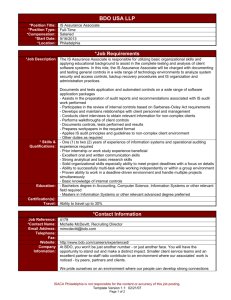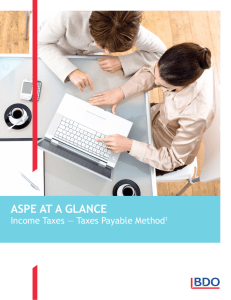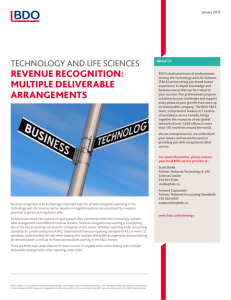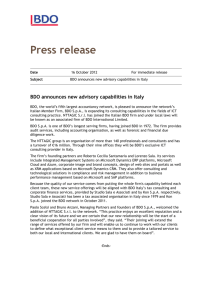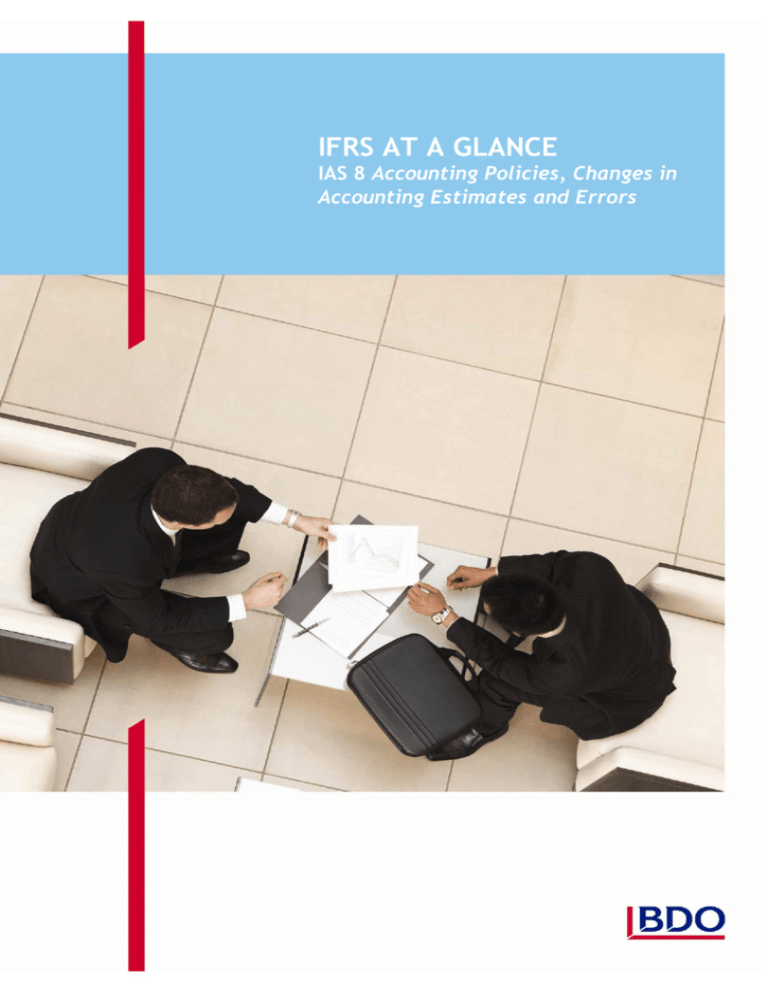
IFRS AT A GLANCE
IAS 8 Accounting Policies, Changes in
Accounting Estimates and Errors
As at 1 July 2015
IAS 8 Accounting Policies, Changes in
Accounting Estimates and Errors
Effective Date
Periods beginning on or after 1 January 2005
ACCOUNTING POLICIES
CHANGES IN ACCOUNTING ESTIMATES
ERRORS
Definition:
Accounting policies are the specific principles, bases, conventions, rules and practices applied by an entity in
preparing and presenting financial statements.
Definition
A change in an accounting estimate is an adjustment
of the carrying amount of an asset or liability, or
related expense, resulting from reassessing the
expected future benefits and obligations associated
with the asset or liability.
Definition
Prior period errors are omissions from, and
misstatements in, an entity’s financial statements for
one or more prior periods arising from failure to
use/misuse of reliable information that:
Was available when the financial statements for that
period were issued
Could have been reasonably expected to be taken
into account in those financial statements.
Selection and application of accounting policies:
If a standard or interpretation deals with a
transaction, use that standard or interpretation
If no standard or interpretation deals with a
transaction, judgment should be applied. The
following sources should be referred to, to make
the judgement:
Specific
quantitative disclosure requirements:
- Requirements and guidance in other
standards/interpretations dealing with similar
Specificissues
quantitative disclosure requirements:
- Definitions, recognition criteria in the
framework
- May use other GAAP that use a similar
conceptual framework and/or may consult
other industry practice / accounting literature
that is not in conflict with standards /
interpretations.
Consistency of accounting policies:
Policies should be consistent for similar transactions,
events or conditions.
Only change a policy if:
Standard/interpretation requires it, or
Change will provide more relevant and
reliable information.
Principle
If change is due to new standard /
interpretation, apply transitional provisions.
If no transitional provisions, apply
retrospectively.
If impractical to determine period-specific
effects or cumulative effects of the error, then
retrospectively apply to the earliest period
that is practicable.
Disclosure
The title of the standard / interpretation
that caused the change
Nature of the change in policy
Description of the transitional provisions
For the current period and each prior period
presented, the amount of the adjustment
to:
- Each line item affected
- Earnings per share.
Amount of the adjustment relating to prior
periods not presented
If retrospective application is
impracticable, explain and describe how the
change in policy was applied
Subsequent periods need not repeat these
disclosures.
Principle
Recognise the change prospectively in profit or loss
in:
Period of change, if it only affects that period; or
Period of change and future periods (if
applicable).
Disclosure
Nature and amount of change that has an effect
in the current period (or expected to have in
future)
Fact that the effect of future periods is not
disclosed because of impracticality
Subsequent periods need not repeat these
disclosures.
Errors include:
Mathematical mistakes
Mistakes in applying accounting policies
Oversights and misinterpretation of facts
Fraud.
Principle
Correct all errors retrospectively
Restate the comparative amounts for prior periods in
which error occurred or if the error occurred before
that date – restate opening balance of assets,
liabilities and equity for earliest period presented.
If impractical to determine period-specific effects of
the error (or cumulative effects of the error), restate
opening balances (restate comparative information) for
earliest period practicable.
Disclosure
Nature of the prior period error
For each prior period presented, if practicable,
disclose the correction to:
- Each line item affected
- Earnings per share (EPS).
Amount of the correction at the beginning of earliest
period presented
If retrospective application is impracticable, explain
and describe how the error was corrected
Subsequent periods need not to repeat these
disclosures.
For further information about how BDO can assist you and your organisation, please get in touch with one of our key contacts listed below.
Alternatively, please visit www.bdointernational.com/Services/Audit/IFRS/IFRS Country Leaders where you can find full lists of regional and
country contacts.
Europe
Caroline Allouët
Jens Freiberg
Teresa Morahan
Ehud Greenberg
Ruud Vergoossen
Reidar Jensen
Maria Sukonkina
René Krügel
Brian Creighton
France
Germany
Ireland
Israel
Netherlands
Norway
Russia
Switzerland
United Kingdom
caroline.allouet@bdo.fr
jens.freiberg@bdo.de
tmorahan@bdo.ie
ehudg@bdo.co.il
ruud.vergoossen@bdo.nl
reidar.jensen@bdo.no
m.sukonkina@bdo.ru
rene.kruegel@bdo.ch
brian.creighton@bdo.co.uk
Asia Pacific
Wayne Basford
Zheng Xian Hong
Fanny Hsiang
Khoon Yeow Tan
Australia
China
Hong Kong
Malaysia
wayne.basford@bdo.com.au
zheng.xianhong@bdo.com.cn
fannyhsiang@bdo.com.hk
tanky@bdo.my
Latin America
Marcelo Canetti
Luis Pierrend
Ernesto Bartesaghi
Argentina
Peru
Uruguay
mcanetti@bdoargentina.com
lpierrend@bdo.com.pe
ebartesaghi@bdo.com.uy
North America & Caribbean
Armand Capisciolto
Wendy Hambleton
Canada
USA
acapisciolto@bdo.ca
whambleton@bdo.com
Middle East
Arshad Gadit
Antoine Gholam
Bahrain
Lebanon
arshad.gadit@bdo.bh
agholam@bdo-lb.com
Sub Saharan Africa
Nigel Griffith
South Africa
ngriffith@bdo.co.za
This publication has been carefully prepared, but it has been written in general terms and should be seen as broad guidance only. The publication cannot be relied
upon to cover specific situations and you should not act, or refrain from acting, upon the information contained therein without obtaining specific professional
advice. Please contact your respective BDO member firm to discuss these matters in the context of your particular circumstances. Neither BDO IFR Advisory
Limited, Brussels Worldwide Services BVBA, BDO International Limited and/or BDO member firms, nor their respective partners, employees and/or agents accept
or assume any liability or duty of care for any loss arising from any action taken or not taken by anyone in reliance on the information in this publication or for any
decision based on it.
Service provision within the international BDO network of independent member firms (‘the BDO network’) in connection with IFRS (comprising International
Financial Reporting Standards, International Accounting Standards, and Interpretations developed by the IFRS Interpretations Committee and the former Standing
Interpretations Committee), and other documents, as issued by the International Accounting Standards Board, is provided by BDO IFR Advisory Limited, a UK
registered company limited by guarantee. Service provision within the BDO network is coordinated by Brussels Worldwide Services BVBA, a limited liability
company incorporated in Belgium with its statutory seat in Brussels.
Each of BDO International Limited (the governing entity of the BDO network), Brussels Worldwide Services BVBA, BDO IFR Advisory Limited and the member
firms is a separate legal entity and has no liability for another such entity’s acts or omissions. Nothing in the arrangements or rules of the BDO network shall
constitute or imply an agency relationship or a partnership between BDO International Limited, Brussels Worldwide Services BVBA, BDO IFR Advisory Limited and/
or the member firms of the BDO network.
BDO is the brand name for the BDO network and for each of the BDO member firms.
© 2015 BDO IFR Advisory Limited, a UK registered company limited by guarantee. All rights reserved.
www.bdointernational.com

